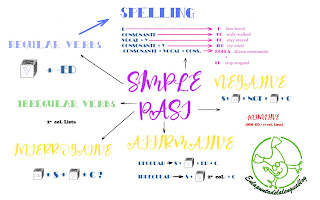La semana pasada vimos el present perfect y como dijimos entonces tiene una conexión con el pasado y por esa razón hoy vamos a ver cuando debemos usar un tiempo y cuando el otro.
Empezaremos con unos esquemas de estos tiempos para que sirvan de recordatorio de las estructuras de ambos.
Y ahora vamos a ver cuando su usa cada uno.
|
SIMPLE PAST |
PRESENT PERFECT |
|
Acciones acabadas que tuvieron lugar en un momento determinado del pasado. They went to the cinema yesterday Hablar de rutinas y hábitos en el pasado. En este caso también se puede usar used to+infinitivo. She used to have long dark hair.
Una sucesión de acciones en el pasado. She got up, had a shower and went to the ofiice. Acciones puntuales que interrumpen una acción en progreso en el pasado. She was having a bath when the phone rang. Para preguntar y responder a preguntas con when…? Con expresiones: yesterday, last week, two years ago, in 1998, when I was ten, etc.
|
Acciones que comenzaron en el pasado y continúan en el presente, generalmente con for y since. She has studied English since last year. Acciones que se originan en un momento no concreto del pasado pero que se prolonga hasta el momento de hablar (afecta de alguna forma al presente) I have lost my keys and I can’t open the car door Para preguntar y responder a preguntas con How long…? Con expresiones: today, this week, since 1998, recently, so far, etc. |
Después de todo esto lo mejor es ponerlo en práctica con algunos ejercicios que os dejo a continuación. Para empezar, una tabla para completar con las formas que faltan de los verbos irregulares
|
infinitive |
past |
participle |
infinitive |
past |
participle |
|
beat |
|
|
ride |
|
|
|
|
wore |
|
|
|
hidden |
|
meet |
|
|
|
spoke |
|
|
|
|
understood |
light |
|
|
|
|
slept |
|
|
left |
|
|
|
spend |
|
grow |
|
|
|
forgive |
|
|
burn |
|
|
|
hold |
|
|
|
|
swum |
Completar las oraciones poniendo el verbo en present perfect o el past simple según corresponda
They (beat) us at football for the last five years.
She (become) manager of the factory in 1998.
My parents (give) me some money when I left home.
Mr Bross (work) in a bank for 15 years. Then he gave it up.
Maggie lives in London. She (live) there all her life.
Ann and Mark are married. They (be) married for 3 years.
The weather (be) very nice recently, but when we were on holiday, the weather (be) awful.
Ordenar las palabras para formar oraciones.
here / Monday / has / Jane / since / been
2010 / has / in a library / my sister / since / worked
since / haven’t / the fire / been / they / at school
him / for / known / ages / I’ve
three / had / years / Anna / a motorcycle / for / has
eaten / since / she / with Harry / that awful meal / hasn’t
Corregir los errores que aparecen en las siguientes oraciones.
I haven’t seen her before three weeks.
She worked for a charity since January.
How long have you knew about the picnic?
I have lived in France to years ago.
Espero que todo ello os sirva para
diferenciar cuando se debe utilizar cada uno de los tiempos. I’ll be here again
next week. Click and share! 😸



Comentarios
Publicar un comentario